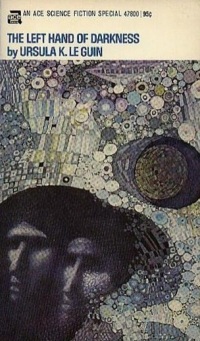
I’m still slowly working on reading the great classics of science-fiction that every fan of the genre should read at least once. I’ve been a fan of Ursula K. Le Guin’s Earthsea series ever since high school but I’ve read precious few of her more substantial Hainish Cycle novels. The Left Hand of Darknes, originally published in 1969, is perhaps the most well-known of these and was the big book that made Le Guin a great SF writer so it’s well past time that I got around to reading it.
I have read The Dispossessed, published in 1974 but judging from the events in the books apparently set thousands of years before The Left Hand of Darkness. There are obvious stylistic and thematic parallels between the two books. In each of the two books, two different societies that are rivals to each other are described. The reader takes the role of tourist to compare and remark upon the differences and similarities between the two rival societies. In The Dispossessed, the contrast is between the capitalist Urras and the anarcho-communist Anarres, obvious allusions to the United States and the Soviet Union.
The rivalry in The Left of Darkness is more subtle. Genry Ai is an envoy from the Ekuman, an interplanetary alliance of more than 80 planets to ice-bound planet Gethen. The denizens of all the member worlds are recognizably human and the theorists of the Ekuman speculate that all of them originated from the same homeworld but were scattered across the galaxy untold eons ago. On some planets however, the colonists were genetically modified. This is the case of the Gethens who are all androgynes who are neither permanently male nor female.
Instead they have a complex sexual cycle that lasts for approximately one month. Most of the time, Gethens are sexually inactive and genderless. However during the kemmer phase which lasts for a few days, hormones in their bodies cause physical changes and they become either male or female and acquire strong sexual urges. They have no control over which gender they become as it depends on the other sexual partners nearby. Two Gethens both in kemmer together will synchronize with each other such that one will become male and the other female.
Beyond the physical strangeness of this arrangement, it has profound implications for the structure of Gethen society and the psychology of Gethens. There is no sexual tension, no male dominance, no association of childrearing only with females. Gethens also have no war and Genry Ai theorizes that this may either be because males are required for war or because the hostile environment of the planet, so unrelentingly cold that it is only just habitable for humans, is too resource-starved to support large-scale combat. They do have murders and feuds between neighbors and even border skirmishes between nations, but never war.
The two great nations of Gethen contrast in how they skew in sexual identity. Karhide is arguably more female, more Yin. Its citizens rarely speak directly and rely on a complex system of conversational protocol called shifgrethor which Ai finds mystifying and elusive. He is constantly confused about their motives and their seeming indifference and lack of curiosity about his mission. When he travels to the more organized and centralized Orgoreyn, he is elated to find that its leaders are more boisterous, enthusiastic about their visitor from another world and more plain-speaking. Yet he soon discovers that the indirect speech and tact of Karhide hides great compassion while the seeming openness of Orgoreyn hides deceit and lack of humanity.
Ai also discovers how difficult it is for him to perceive a Gethens without casting him into either as a male or female. It is not until he realizes that his greatest ally and friend on the planet is both female as well as the male he initially sees him as, does he learn how to understand and accept his friend. Much of the novel covers an arduous, desperate trek across the icy wastes. There is nothing there and nothing happens there yet ironically these scenes somehow feel more real compared to the dreamy strangeness of living in the Gethen cities.
This is complex, richly themed novel that works on many different levels. Using the strange society on Gethe as a literary device, Le Guin forces us to consider how gender has shaped and continues to shape our society and our own, individual views of each other. Sexual politics and rights may have come a long way since the 1960s but the masterfulness of the writing makes this novel just as resonant and arresting now as it was then.
I agree, an outstanding novel, and funnily enough, I too read it out of… guilt maybe? I’m going through all the Hugo and Nebula award winners, crossing them off the list and decided that I really need to read one of the few written by a woman.
Glad I did.
I didn’t address it in my review at http://www.sciencefiction-lit.com, but what were your thoughts on the Karhide/Orgoreyn ideas? Was this a cold war produced them of Western wildness and freedom versus Communist organization and subterfuge? Or was I reading more into it based on it’s 1970 publication date?
Would appreciate your thoughts.
Lisa
Hi, thanks for stopping by. As I mentioned in this post, there probably wasn’t an explicit allusion to the US / USSR rivalry in this novel because such an allusion is pretty obvious in the later The Dispossessed. It doesn’t really fit either. Karhide is after all a monarchy while the Orgoreyn is an oligarchy. Probably the US / USSR was on her mind but in this book at least I still think it is more of a study in Yin / Yang contrasts.